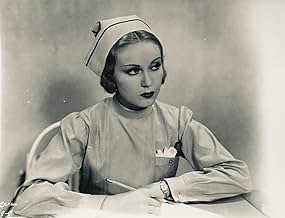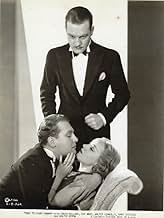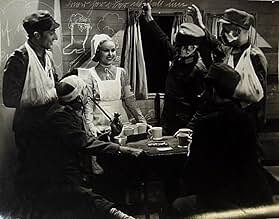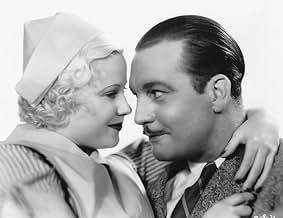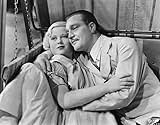During a number of bizarre cases, a dedicated nurse finds love with one doctor while she resents another new doctor who is extremely talented.During a number of bizarre cases, a dedicated nurse finds love with one doctor while she resents another new doctor who is extremely talented.During a number of bizarre cases, a dedicated nurse finds love with one doctor while she resents another new doctor who is extremely talented.
Sheila Darcy
- Gail Drake
- (as Rebecca Wassem)
Leila Bennett
- Sally
- (as Leila Bennet)
Edmund Burns
- Interne
- (uncredited)
Pat Flaherty
- Interne
- (uncredited)
- Director
- Writers
- All cast & crew
- Production, box office & more at IMDbPro
Featured reviews
Nurse Mary Fanshawe (Faye Wray) is the supervisor of nurses at a hospital . She's got two surgeons after her - Dr. Jim Barclay (Ralph Bellamy) and Dr. Freddie Preston. She prefers Preston, and that's too bad because he is not serious about his profession and not really serious about Mary since he sneaks off with nurse Doris Andros for a make out session anytime that he can.
The head surgeon, Dr. Walter Selby (Walter Connally) is planning to do brain surgery on a young female patient there, but what he's planning to do is a half measure. Dr Barclay wants to do something a bit more daring - as in more modern - that will completely cure the patient, but Selby is against it.
So it's these two conflicts that comprise most of the short running time of this B hospital drama - old versus young surgeon, and slipshod versus dedicated surgeon. In between there's drama in the woman's ward at the hospital as their guests come and go. One guest is actually the person who put the woman in the hospital, her husband.
There's nothing really precode about it, though it does have its saucier moments, such as when Doris says about Dr. Preston - "The M. D. in his name means more dames!"
It's worth a look if you are interested in old 30s films.
The head surgeon, Dr. Walter Selby (Walter Connally) is planning to do brain surgery on a young female patient there, but what he's planning to do is a half measure. Dr Barclay wants to do something a bit more daring - as in more modern - that will completely cure the patient, but Selby is against it.
So it's these two conflicts that comprise most of the short running time of this B hospital drama - old versus young surgeon, and slipshod versus dedicated surgeon. In between there's drama in the woman's ward at the hospital as their guests come and go. One guest is actually the person who put the woman in the hospital, her husband.
There's nothing really precode about it, though it does have its saucier moments, such as when Doris says about Dr. Preston - "The M. D. in his name means more dames!"
It's worth a look if you are interested in old 30s films.
"Once to Every Woman" was an enjoyable hospital drama. You had your hospital romance, old school versus new school, an important procedure, and a medical emergency. It was probably just another episode of "ER" for some folks, but it was new to me.
At an anonymous hospital Dr. Walter Selby (Walter Connolly) was the main surgeon. He was widely regarded as the best surgeon in the country, but he was older now. His pupil and assistant, Dr. Jim Barclay (Ralph Bellamy), respectfully considered himself a better surgeon. He wasn't arrogant about it, he simply believed that Dr. Selby's methods and methodology were old and in need of updating. They particularly disagreed on how to handle a benign tumor in a woman's brain.
Running concurrent with that story was that of Nurse Mary Fanshawe (Fay Wray) and her love life. She wasn't a nurse totally consumed with the love of her life, she was too professional for that. In fact, she was so professional she couldn't bring herself to fire an incompetent nurse. She wanted to be sure that she was discharging the nurse for professional reasons and not personal ones. The nurse, Nurse Doris Andros (Mary Carlisle), was a hot blond who Dr. Preston (Walter Byron) couldn't keep his eyes off of. Dr. Preston just so happened to be the man Nurse Fanshawe was in love with.
It was a solid movie. I like that they didn't overly-dramatize the romance. The last thing I care to see in a hospital drama is a romance. It's a hospital; stick to saving lives and helping patients. "Once to Every Woman" had enough drama with two of the patients and the professional feud between Dr. Selby and Dr. Barclay.
Free on YouTube.
At an anonymous hospital Dr. Walter Selby (Walter Connolly) was the main surgeon. He was widely regarded as the best surgeon in the country, but he was older now. His pupil and assistant, Dr. Jim Barclay (Ralph Bellamy), respectfully considered himself a better surgeon. He wasn't arrogant about it, he simply believed that Dr. Selby's methods and methodology were old and in need of updating. They particularly disagreed on how to handle a benign tumor in a woman's brain.
Running concurrent with that story was that of Nurse Mary Fanshawe (Fay Wray) and her love life. She wasn't a nurse totally consumed with the love of her life, she was too professional for that. In fact, she was so professional she couldn't bring herself to fire an incompetent nurse. She wanted to be sure that she was discharging the nurse for professional reasons and not personal ones. The nurse, Nurse Doris Andros (Mary Carlisle), was a hot blond who Dr. Preston (Walter Byron) couldn't keep his eyes off of. Dr. Preston just so happened to be the man Nurse Fanshawe was in love with.
It was a solid movie. I like that they didn't overly-dramatize the romance. The last thing I care to see in a hospital drama is a romance. It's a hospital; stick to saving lives and helping patients. "Once to Every Woman" had enough drama with two of the patients and the professional feud between Dr. Selby and Dr. Barclay.
Free on YouTube.
While not as racy as some pre-code films, this randomly-titled medical drama has the pre-code virtues of fast pacing and credible characters with realistic personal problems.
I've joined the Fay Wray cult, something I never expected. Too bad her talents were underutilized in so many "scream queen" epics. I find her more convincing than standouts like Barbara Stanwyck and Kay Francis when playing the woman torn between career and romance typical of so many films of that era. Maybe she was one of the first to realize that talkies called for a more understated acting style than silent films or Victorian melodramas. Her good looks, attractive speaking voice and clear diction are all pluses too.
Here she plays a dead serious by-the-book head nurse infatuated with a doctor who's the hospital's chief Romeo, with predictable consequences mixed in with the usual sort of medical drama including a subplot about an aging surgeon facing his diminished skills.
Nothing earth-shaking here, just a solid plot with good performances all around, especially Fay Wray's.
I've joined the Fay Wray cult, something I never expected. Too bad her talents were underutilized in so many "scream queen" epics. I find her more convincing than standouts like Barbara Stanwyck and Kay Francis when playing the woman torn between career and romance typical of so many films of that era. Maybe she was one of the first to realize that talkies called for a more understated acting style than silent films or Victorian melodramas. Her good looks, attractive speaking voice and clear diction are all pluses too.
Here she plays a dead serious by-the-book head nurse infatuated with a doctor who's the hospital's chief Romeo, with predictable consequences mixed in with the usual sort of medical drama including a subplot about an aging surgeon facing his diminished skills.
Nothing earth-shaking here, just a solid plot with good performances all around, especially Fay Wray's.
Surgeon Ralph Bellamy wants to operate with the latest techniques. Chief of Surgery Walter Connolly is a bit behind the time. Surgeon Walter Byron is intent of chucking every nurse under the chin, and head nurse Fay Wray wants to do her job as well as she can.... but doesn't mind the occasional chin chucking.
It's from a novel by A.J. Cronin called "Kaleidoscope" and with a script by Jo Swerling and under the direction of reliable Lambert Hillyer, it's...... well, it's a bit plodding. The date of release, in March of 1934, says it's pre-code, but the handwriting was on the wall, and studio head Harry Cohn knew it, and knew this movie's lifetime would extend well into the coming era. So there's an acknowledgment of that, and the movie seems tame, without the fireworks that the creative types could pull off, even under the Code. Miss Wray seems sullen, Bellamy seems naive and oblivious, and it's all been done before and after, and much better.
It's from a novel by A.J. Cronin called "Kaleidoscope" and with a script by Jo Swerling and under the direction of reliable Lambert Hillyer, it's...... well, it's a bit plodding. The date of release, in March of 1934, says it's pre-code, but the handwriting was on the wall, and studio head Harry Cohn knew it, and knew this movie's lifetime would extend well into the coming era. So there's an acknowledgment of that, and the movie seems tame, without the fireworks that the creative types could pull off, even under the Code. Miss Wray seems sullen, Bellamy seems naive and oblivious, and it's all been done before and after, and much better.
Ralph Bellamy and Fay Wray shine as an up and coming and acclaimed surgeon and the head nurse of a hospital ward, respectively.
The film, courtesy of director Lambert Hillyer, fuses romantic melodrama, hospital drama and moral tales most effectively as the film plot moves seamlessly between them.
There are a few moments that we get some information and a scene that are there simply for atmosphere (one of the hospital patients, to be specific) and ultimately don't come back to have any bearing on the plot.
But those are far outweighed by subplots that do indeed have major effects on the main plot, and are done organically and most effectively.
Walter Connolly powerfully plays the head surgeon who has his own set of problems and arc that lends moral and touching weight to the film.
Being pre-code, it explores tensions of a sexual nature in ways that only a few months later wouldn't have been possible under the Hays Code, and that's one of the reasons it stands out. The other is, it often takes what the cliché of the drama would have been, and does the opposite.
This film deserves more recognition and it's a major disservice that it has never had a home video release. Here's to hoping!
The film, courtesy of director Lambert Hillyer, fuses romantic melodrama, hospital drama and moral tales most effectively as the film plot moves seamlessly between them.
There are a few moments that we get some information and a scene that are there simply for atmosphere (one of the hospital patients, to be specific) and ultimately don't come back to have any bearing on the plot.
But those are far outweighed by subplots that do indeed have major effects on the main plot, and are done organically and most effectively.
Walter Connolly powerfully plays the head surgeon who has his own set of problems and arc that lends moral and touching weight to the film.
Being pre-code, it explores tensions of a sexual nature in ways that only a few months later wouldn't have been possible under the Hays Code, and that's one of the reasons it stands out. The other is, it often takes what the cliché of the drama would have been, and does the opposite.
This film deserves more recognition and it's a major disservice that it has never had a home video release. Here's to hoping!
Did you know
- TriviaAlthough the title card bears a 1933 (MCMXXXIII) copyright statement, it was not copyrighted or released until 1934.
- GoofsWhen the nurse hands Fanshawe the evening's report, the nurse then puts her right hand behind her right leg. But on the next cut, as Fanshawe reads the report, she now has her right hand in front of her and resting on the desk.
- Quotes
Mary Fanshane: I guess I'm immune.
Dr. Barclay: Against what?
Mary Fanshane: Against this silly business called love.
Details
- Release date
- Country of origin
- Language
- Also known as
- Skæbner paa Stue K
- Production company
- See more company credits at IMDbPro
- Runtime
- 1h 10m(70 min)
- Color
- Aspect ratio
- 1.37 : 1
Contribute to this page
Suggest an edit or add missing content

